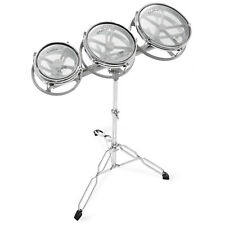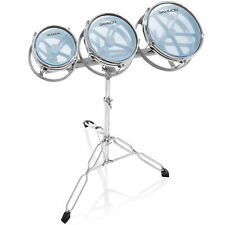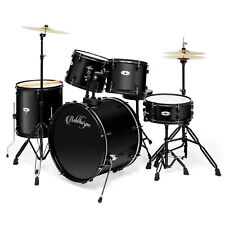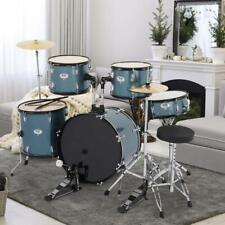|
Creem Magazine, Fleetwood Mac Creem Magazine, January 1980 FLEETWOOD MAC Lord of the Big Mac Manor: Mick Fleetwood Delivers the Word
by Patrick Goldstein "Will you look at this," Mick Fleetwood groaned, pointing in the general direction of his new mushroom brown boots. It's tough for the lanky drummer to be more precise-when you're Fleetwood's size, you need a telescope just to tie your shoes. He stretched his long, serpentine legs, idly eyeing his left boot the way an old far-sighted traffic cop would stare at a speeding ticket. One of Fleetwood's stylish boots is dotted with a wavy grid of black blotches. "They're brand new boots, too," he sighed. "I bought them at this posh little shop in Beverly Hills the other day. And no sooner had I worn them that I managed to destroy them. I was walking down some stairs and accidentally knocked over a can of motor oil which promptly spilled all over the shoes." As the sonic anchor of Fleetwood Mac mulled over this peculiar dilemma, munching on a salad and sipping some coffee, he gave me a chance to study his remarkable physical presence. Fleetwood's towering 6'6" frame is a rarity among British musicians-most tea bags are lucky if they can se over a row of hedges. When he strolls down Sunset Strip, hurrying to one of his favorite saloons, Fleetwood dwarfs his companions, reminding passersby of Bert Lahr shepherding a flock of munchkins onto the set of The Wizard of Oz. Fleetwood's looming figure is matched by a singular athletic grace. Whether on stage, where he attacks his drum kit with sleek cat-like strokes, or in his management offices, where he can make the simplest phone conversation seem like an elegant social engagement, Fleetwood looks like the man who would be king, whose world has a comfy chair in every room. Anyone who's ever seen his band in concert has probably noticed that Fleetwood Mac exudes this same off-hand touch of class. Even those of us more taken with bad boys like Elvis Costello or incandescent performers like Bruce Springsteen find it hard to name a band that offers more verve, variety and sheer compositional talent than the Big Mac. More than anything else, the group displays a kind of resilient musical symmetry rarely seen today, exploring the strange intimacies of romance as well as the careless ways of love. Fleetwood Mac is perhaps rock 'n' roll's last true royal family. It's easy to imagine Fleetwood as a bold, iron-fisted king, whose occasional fits of temper are offset by Christine McVie's gentle, queenly restraint. The rest of the band neatly fills out this rock royal flush; with Lindsey Buckingham serving as the shy but ambitious crown prince; John McVie as the king's taciturn elder adviser and, of course, the ever-elusive Stevie Nicks as the lovely young princess captivated by the magical potions in Merlin's chambers. This portrait would be too fanciful for most bands, but Fleetwood Mac thrives on the rarified air of our rock fantasies. After the huge success of Rumours, many rock stars would have been happy to take up residence at Studio 54. Fleetwood Mac spent the night at the studio, all right-Studio D at the Village Recorders in Hollywood, where the group spent 18 months making Tusk, an act of artistic devotion guaranteed to warp anybody's sense of reality. Of course, the beat goes on, and by the time the band stumbled back out into Hollywood's piercing smog light, the rock terrain had undergone a series of tumultuous upheavals. Imagine Mick Fleetwood's surprise when he found placid Lake Peter Frampton and Valley of the Bee Gees seething with punk explosions, disco infernos and a rockpile of new wave debris. If this wasn't enough to unnerve the band, surely the tidal wave of anticipation from music industry moguls-unnerved by all the volcanic activity and sorely in need of a multi-platinum sales boom-would've unhinged the most unflappable studio veteran. Faced with the worst economic slump in its history, the entire record industry wondered aloud: Can Fleetwood Mac sell another 13 million albums? Can the band bring kids back into the record stores? Will this be the album that breaks the bank? In other words, every jive hustler on Hollywood Boulevard is whistling the same tune-can Fleetwood Mac save our ass? Mick Fleetwood may bear a fleeting resemblance to Jesus Christ but he's not particularly thrilled to be cast in the role (maybe he remembers how the movie ends). "The band knows people have been acting like we're going to single-handedly rescue the record business," he said, only betraying a hint of impatience. "There's just a lot of paranoia in this business. But what can you say about a business slump, except that there isn't any record business if there aren't any good records out there." Fleetwood, who doubles as the group's manager, also revealed that even his record company wanted the group to consider not making a double album. "It has its perils," he admitted. "If we don't make a great double album, then it could be stiff worse than a single one." The reason's obvious-like the Eagles, Bruce Springsteen, Led Zeppelin and many other top rock talent these days, Fleetwood Mac releases albums about as often as the Chicago Cubs win the pennant. When the result is a gooey chunk of ear candy like the Eagles' new record, you gotta wonder what these guys have been doing all year-practicing for their softball season? By Fleetwood's own admission, Tusk cost more than a million dollars despite the fact that many of the tracks were recorded at Lindsey Buckingham's house on his own 24-track machine. "Spending all that time on an album definitely raises people's expectations," Fleetwood said, stretching his legs over an office chair. "But so what if it costs $15? That's what records cost. It has 20 songs on it, it's a really nice package, and after all, no one's forced to buy it, are they?" Fleetwood stared at his oil-spattered boots. "A good album is like a good pair of shoes," he decided. "I buy good ones because I hope that maybe they'll last a little longer. It would mean more to me than anything else if, five years from now, someone would say, 'Hey, that was a really great album'." As for the group's studio hibernation, Fleetwood dispelled any notion that the band spent its time practicing exotic sexual positions on the studio consoles or organizing impromptu cricket matches. "We bloody well worked all the time," he growled. "It doesn't go to waste. I'll tell you what it's like, every fucking day, stuck in the same room experimenting with this and scrapping that. Sure, it's not the most efficient way to use the time, but it's how we work best." But Mick-a million bucks-is that for real? You could probably buy Cleveland for that much. "It's no exaggeration," Fleetwood admitted. "Our accountants couldn't believe the money we spent. Before we started the album, I told the group we should just buy the entire studio. And sure enough, we could have done it easily. This time around, we're considering building a new studio or at least buying one and renovating it." Fleetwood jabbed his salad fork in the air. "Let's remember one thing: for a rock band, a studio is not a luxury, it's a necessity. It drives me crazy to watch other groups afraid to spend their money on themselves. We don't want to invest our money in a laundromat down the road. We want to spend it on the band and on making what we do that much better." Perhaps the most controversial song on Tusk is the title track, which was released as a single several weeks before the rest of the album hit the racks. Recorded in part at Dodger Stadium with the aid of the USC marching band (they now play it as a fight song at USC football games), the single caught most radio programmers by surprise. After all, was this the long-awaited new 45 from one of the world's biggest selling bands or a remake of the baby elephant walk? Fleetwood cheerfully cleared up the whole mystery with a predictably tongue-in-cheek explanation. "It's called 'Tusk' for obvious reasons," he said. "It sounds like tusk. Actually, it comes from a riff that Lindsey and I used to play at our sound check to get the right recording levels." More importantly, Fleetwood has been conniving for years to sneak a brass band onto a Big Mac track. Finally, after years of blues numbers, ballads and sinewy rockers, Fleetwood had his opportunity. As soon as Buckingham brought in a rough mix of his own sound check guitar figure, Fleetwood saw his opening. "This was the perfect track," he said. "I told everyone else, 'Whether you like it or not, we're going to have a brass band on this song.' I've even had visions of us on tour, with the local Salvation Army band coming up on stage and playing that part with us." As band manager, Fleetwood's decisions are not always so preemptory. He's more like a benevolent dictator, patiently explaining to the rest of the Mac Attack the importance of a tour schedule or the financing of a new recording studio. He learned the hard way-Fleetwood Mac's original manager was fired after, unbeknownst to the group, he booked a fake version of the band on a lengthy 1974 American tour ruining, as Fleetwood puts it, "a lot of good faith we'd built up over the years of touring here. It took us almost a year to persuade people that we were actually still a band after that." That sordid affair left an indelible imprint on Fleetwood's managerial strategem. "I don't really trust anybody," he said grimly. "I don't assume that anyone will do anything right. So I'm a compulsive worrier-even if something doesn't go wrong, I'll still be worrying about it." Managing the band himself, virtually unprecedented in the annals of rock, allows Fleetwood to exercise total creative control over every aspect of the Mac's sprawling musical empire. "Human beings are not fail-safe," he explained. "I just don't want mistakes being made on my behalf. I'd rather make the mistake myself. All too often being successful means drifting into a lifestyle where you can be completely naïve to what decisions are being made. You just can't let control of those things slip out of your hands." Fleetwood is as single-minded as he sounds. He recently tried to take a vacation, only to end up in a leaky thatched hut on a deserted South Seas island. Unable to locate any vestiges of civilization-like a telephone or room service-Fleetwood beat a hasty retreat back to Hollywood, where things like dinner salads are more plentiful. On this tropical isle, Fleetwood had the nagging suspicion that, if he wanted a salad, he would have to grow one. And what he does when he's not working on a new Mac Attack, he grinned, "I dream about working on the next one. I really don't have any hobbies at all, unless you count collecting cars." Here Fleetwood may be unduly modest. He has managed to amass an enviable little brood of automobiles, highlighted by a 1966 Ferrari 275-GTB, a 1966 Jensen CF V8, and a 1965 Alvis. That last item seemed a bit obscure. "Well," Fleetwood admitted, "you don't see them much over here. The Duke of Edinborough has an Alvis. It's the typical snob English car that is so snobbish that they don't make them anymore." Fleetwood also has an MG, a Porsche and a Mercedes for just puttering around town. "And believe it or not, I use them all," he said sternly. "It's quite scientific, actually-I use whichever one has the most gas." And if Fleetwood loves cars, he absolutely adores the road. There's nothing like a rock 'n' roll tour. It's like a travelling circus full of acrobats working without a net...cartwheels in the airport...backstage lovelies in smeared black mascara and pink glider tights...soccer matches by the hotel pool...ice cubes in every bathtub...Fleetwood has spent nearly 15 years practicing his night moves. But what about the rest of the band? Fleetwood gave a quick summary. "John [McVie] adores it, he's the first on the plane. Christine is real trouper-she's adapted to all the rigors. Lindsey, on the other hand, can do without it. As for Stevie, she doesn't really like traveling, but she's an audience addict, so she rises to the occasion." Fleetwood is the first to admit that the band enjoys traveling in style. "We're just not that money-conscious," he said. "There's enough money to go around for a while, and I have a feeling there'll always be more." He paused, concerned that he may have appeared a bit flippant. "You should remember that most of this troupe came up the hard way. When we were in the early British blues bands, we spent virtually every night of our lives driving up or down some horrid British motorway. It was an extremely primitive way to make a living. "Christine may like to enjoy a bit of luxury now, but I can remember when she used to have to sleep on top of a Hammond organ for weeks on end because no one could afford to pay for a hotel room. So we've all worked very hard for what we've supposedly got. And now we get to play music and still make money at it too." The toughest part of Fleetwood's life involves his adjustment to the constant adulation and attention-the relentless vice-like grip of the spotlight. "Sure, it's a terrible threat," he admitted. "You have to work harder at keeping what's precious to you. It becomes a question of priorities. I truly enjoy making money, but when I was living on the dole I still used to save up for a pair of tailored pants and a new car. As a matter of fact, I've always had a lot of cars." The big daddy of the Big Mac chuckled. "They're just in better shape now." Thanks to Karen for posting this to The Ledge.
|








